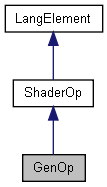GenOp Class Reference#include <shaderOp.h>
Inheritance diagram for GenOp:  Detailed DescriptionGenOp - General Operation - Very useful for combining several variables into one LangElement statement. It uses an elipses as a parameter, so it can take as many variables as you can throw at it. It takes a string and parses it for the '@' symbol which it replaces with passed in parameters. Similar to the C statement printf(). Here's an example:
( assuming three variables var1, var2, var3 exist and their assigned names
are var1Name, var2Name, and var3Name )
LangElement *statement = new GenOp( " @ = @ * @.x + @.y;", var1, var1, var2, var3 );
The output in the shader file would be:
var1Name = var1Name * var2Name.x + var3Name.y;
Member Typedef Documentation
Constructor & Destructor Documentation
Member Function Documentation
Reimplemented from LangElement.
Member Data Documentation
|
|||||||||||||||||||||||||||||||